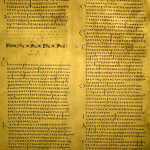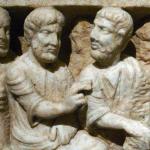Today, guest columnist Ben Conroy wrote a piece (at Elizabeth Scalia’s The Anchoress blog) titled ‘Sense’ and Sensibility (In Defense of Donald Rumsfeld). In it he astutely probed and considered the former Defense Secretary’s (in)famous and perhaps not uniquely original insight:
“As we know, there are known knowns; there are things we know we know. We also know there are known unknowns; that is to say we know there are some things we do not know. But there are also unknown unknowns – the ones we don’t know we don’t know.”
Ben does a nice job proceeding to describe how Rumsfeld’s judgment and the judgment of many of his detractors are informed not simply by rational thought, but by, in Ben’s words, “a ‘sense’ of things, an unquestioned, sub-rational frame” that guides our worldview for better or for worse. It is a worthwhile read to consider.
But I still have Donald Rumsfeld on my brain.
This immortalized quote of Rumsfeld’s has stuck with me since I first heard it in 2002. First, read it again.
“As we know, there are known knowns; there are things we know we know. We also know there are known unknowns; that is to say we know there are some things we do not know. But there are also unknown unknowns — the ones we don’t know we don’t know.”
Hmmm. Now honestly think about it. It makes sense, doesn’t it? Now let’s evaluate the context in which he said it. It was a Defense Department press conference in February 2002, barely four months after the war in Afghanistan against the Taliban and Al Qaeda elements began, five months after the attacks on September 11th and on the eve of a new campaign to root out regrouping Taliban and Al Qaeda contingents known as Operation Anaconda. The Iraq War was still over a year away. So let’s look at the larger dialogue surrounding Donald Rumsfeld’s quote.
Q: Could I follow up, Mr. Secretary, on what you just said, please? In regard to Iraq weapons of mass destruction and terrorists, is there any evidence to indicate that Iraq has attempted to or is willing to supply terrorists with weapons of mass destruction? Because there are reports that there is no evidence of a direct link between Baghdad and some of these terrorist organizations.
Rumsfeld: Reports that say that something hasn’t happened are always interesting to me, because as we know, there are known knowns; there are things we know we know. We also know there are known unknowns; that is to say we know there are some things we do not know. But there are also unknown unknowns — the ones we don’t know we don’t know. And if one looks throughout the history of our country and other free countries, it is the latter category that tend to be the difficult ones.
And so people who have the omniscience that they can say with high certainty that something has not happened or is not being tried, have capabilities that are — what was the word you used, Pam, earlier?
Q: Free associate? (laughs)
Rumsfeld: Yeah. They can — (chuckles) — they can do things I can’t do. (laughter)
Now, stop. What is your reaction? To some extent, it is impossible to approach it without bias (or ‘a sense’, as Ben Conroy aptly points out in his piece). If you opposed the Iraq War and considered Donald Rumsfeld arrogant, chances are that you resent him and have disdain for anything he has to say. Simultaneously, if you supported the Iraq War and appreciated Rumsfeld’s confident style, you are likely to consider his words with greater interest, if not affection. But that is the problem. There comes a time when we need to honestly and fairly consider whether what someone said has any merit regardless of whether we like them or what they were involved in. I am not going to divulge how I feel about the Iraq War generally or Donald Rumsfeld specifically because when I am considering the general truth of his statement about known knowns, known unknowns and unknown unknowns, those opinions shouldn’t matter.
Bruce Springsteen has some views on issues with which I disagree, but he also can write mesmerizing and poetic music that appeals to my Catholic sensibility. I have read numerous books by Ayn Rand which simultaneously intrigued and repelled me, but she has said some things from time to time that I believe are insightful. Winston Churchill made some dreadful statements in his political career, but he also diagnosed and articulated the menaces of Communism and National Socialism in a fashion unmatched by his contemporaries. King Lear’s fool was – well – a fool, but he made some incisive observations. If you do or do not like these people, I don’t care. The mere fact that we like or don’t like someone does not necessarily dismiss them from ever saying something that is true or insightful. At the very least, perhaps we should simply consider the merit or truth in what exactly is being said. Even though I am proud and stubborn, I have sometimes learned great lessons from people I don’t like. As St. Basil said to the early Christians about approaching the pagan literature,
“Bees do not visit all the flowers without discrimination, nor indeed do they seek to carry away entire those upon which they light, but rather, having taken so much as is adapted to their needs, they let the rest go.”
Sometimes we need to extract the small bit of nectar and then let the rest go. Otherwise, we not only risk overlooking a simple bit of wisdom in the words of the controversial Donald Rumsfeld, an insight by the fiery Ayn Rand or the erudition of King Lear’s fool, but, even more, we may miss the life-changing words from that wild-eyed, locust-eating prophet or that persecutor-turned-proselytizer or that shame-faced disciple trying to make good.
No, no, no…I am not placing Rumsfeld or Rand on the level of prophets or apostles. Not at all. Rather (and quite simply), I am saying that sometimes a truth or piece of wisdom can come out of an unlikely or even unattractive source whether we like it or not. There is no doubt it is sage wisdom to “consider the source”. Indeed. But in order to avoid being blinded by our own bias, sometimes – perhaps only sometimes – it is good to stop and NOT consider the source. Yes. Perhaps.
And you can consider that a known known.
For previous thoughts on a similar theme, please see my post The Tiresome Fad of Giant Killing

















